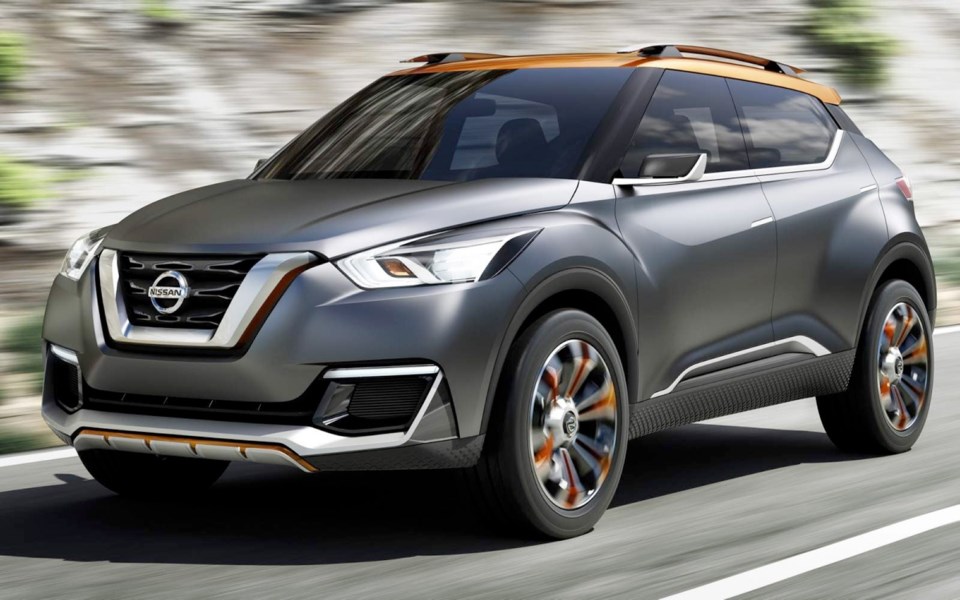Nissan gets its Kicks
The Sleuth applauds the automaker for its entry into the small-and-tall-wagon market. If you weren’t already aware, this category is quickly growing with relatively affordable products such as the Chevrolet Trax, Honda HR-V, Hyundai Kona, Jeep Renegade, Mazda CX-3 and the upcoming Ford EcoSport. The new Nissan model, called the Kicks, will differ in a significant way from much of the rest of the group by not offering an all-wheel-drive variant. The only other vehicle following the same path is the new-for-2017 Toyota C-HR. Although the lack of an AWD option might not be concerning for prospective buyers dwelling in warm climes, it matters a great deal to the rest of the country where many drivers consider all-wheel drive to be a necessity. Weirdly, the C-HR can be ordered in most other markets with all-wheel-drive.
Travelling on with Avalon
We won’t officially know all the details concerning the 2019 Toyota Avalon until sometime in 2018, but the Sleuth’s sources are reporting that the brand’s flagship sedan will look nothing like the current design that has been around since the 2013 model year. The Sleuth hears that the Avalon’s front end will look downright aggressive, which is a far cry from the current large-mouth air intake that’s not to everyone’s liking. The 301-horsepower, 3.5-litre V-6 that’s optional in the 2018 Camry sedan will be installed, but you can also expect that model’s optional (and much improved) hybrid system. It’s also likely that all-wheel-drive could be a first-ever option for the Avalon.
Is the Fusion in trouble?
Those who purport to be in the know are claiming that Ford’s midsize sedan could be cancelled outright by 2020, but the Spymaster hears that that’s not likely to happen. Instead, word has it that Fusion production will move to China from Mexico, which will free up factory space for new wagon-shaped models and partial and 100 per cent electrified vehicles. From there, it’s possible that, barring a complete meltdown in North American sedan sales, the sedan will be imported from China. Although Fiat Chrysler Automobiles recently dropped out of the compact and midsize sedan game (ending the Dodge Dart and the Chrysler 200), other automakers have shown that the category remains viable although somewhat diminished.
Mercedes-Benz readies a new G-wagon
There’s something about classic (boxy) off-road vehicles that speaks to the heart. The Germany-based automaker’s answer to the Land Rover and Jeep Wrangler is at the premium end of the scale, but is no less revered by its financially comfortable clients. Following decades of only minimal changes, an all-new 2019 G-Class will soon break cover. Although the Sleuth’s sources are certain that the body styling won’t change a great deal, they believe that newer chassis and suspension components will make a big difference in reducing the G class’s 2,600-kilogram weight. The interior will be completely redesigned to include the latest digital components to rival the E- and S-class sedans. The current twin-turbocharged V-8 will likely carry over, but a twin-turbo V-6 is a possible starting-point engine.
No more lagging behind, says Volvo
The Spymaster is excited to hear that the Sweden-based automaker has come up with a simple, yet effective solution to once and for all rid turbocharged engines of lag, that dead-pedal feeling when you first hit the accelerator.
Volvo’s solution, called Power Pulse, involves using an air compressor attached to an electric motor. When the accelerator is pushed, the compressor immediately delivers a burst of air from a small tank to the exhaust manifold, thereby spinning up the turbo, which responds to exhaust-gas velocity. Power Pulse will soon be added to Volvo’s production engines and the Sleuth hopes that similar systems will become available in other manufacturers’ vehicles.
Geely to acquire part of Daimler
The China-based company that owns Volvo will reportedly purchase up to five per cent of Mercedes-Benz’s parent company. The expenditure of about $4.7 billion US would make Geely the second-largest shareholder if Daimler, ahead of the Renault-Nissan alliance that currently holds a 3.1 per cent stake in Daimler.
Insurance rates for vehicles equipped with self-driving technology: It’s not a massive rebate, but an insurance company in Britain is offering a five per cent discount to owners of Tesla vehicles — and others — equipped with self-driving technology.
According to published reports, Direct Line insurance wants to collect data to confirm that customers who drive such vehicles are involved in fewer collisions than customers in cars without self-driving technologies.



